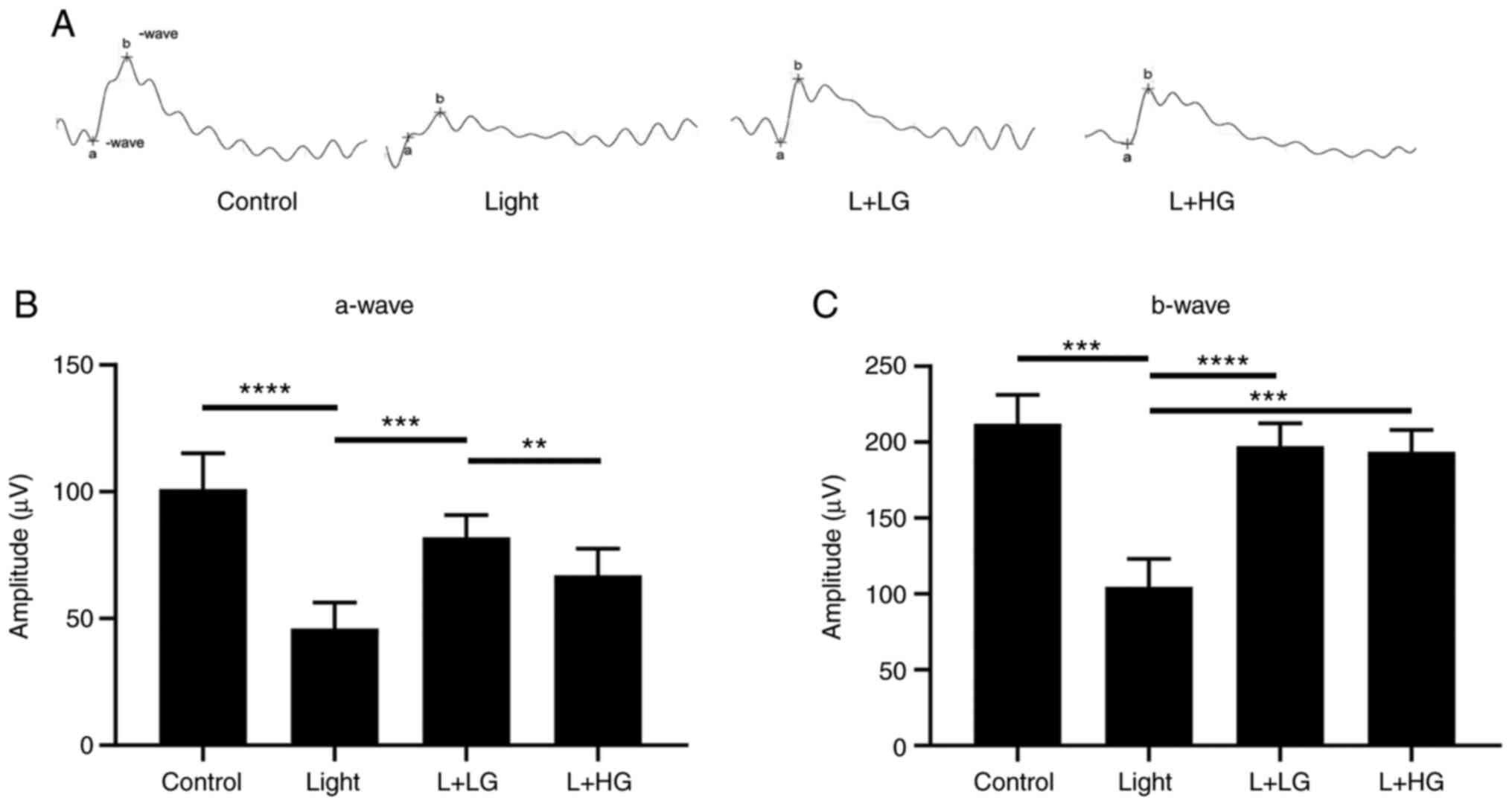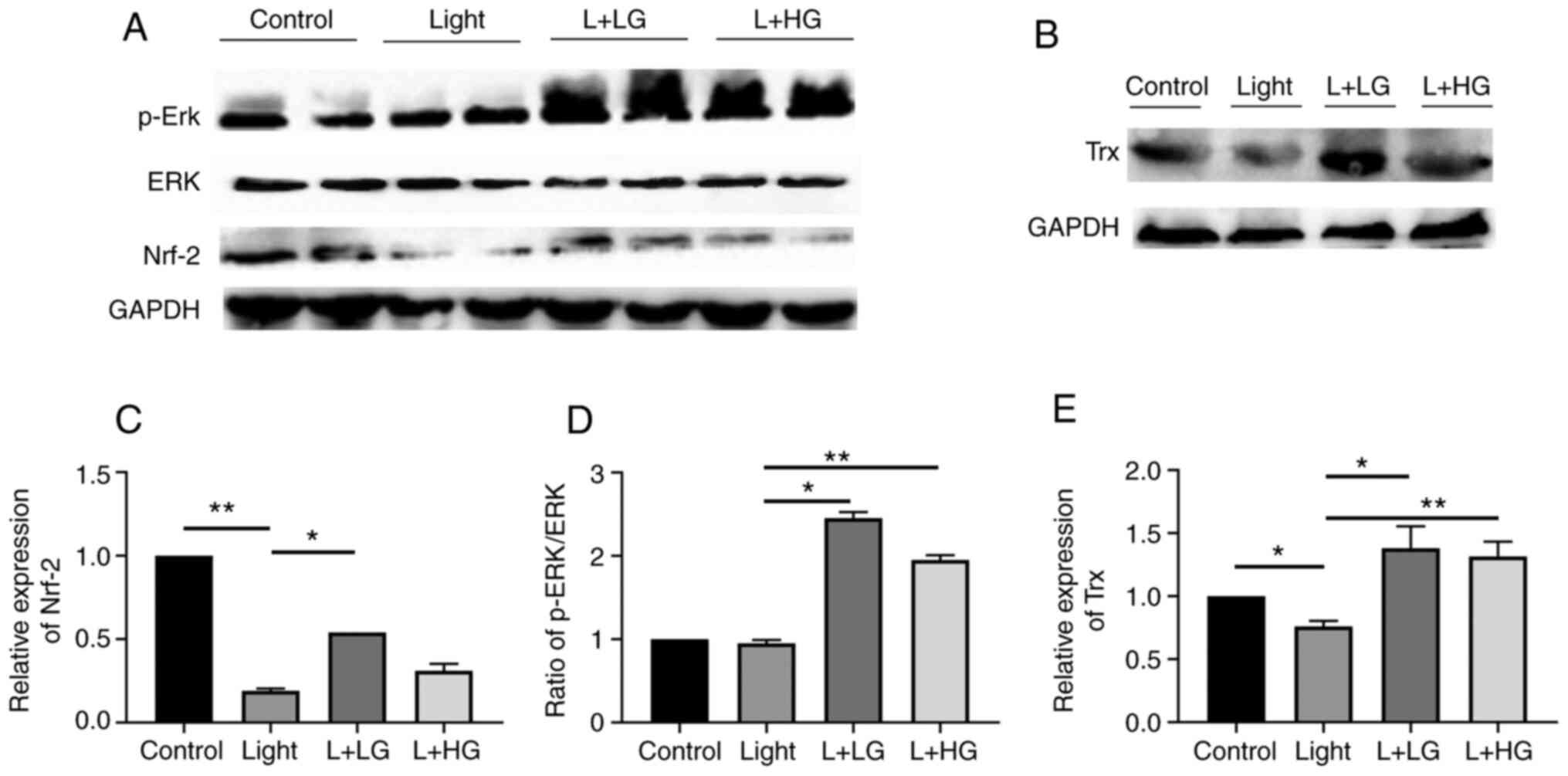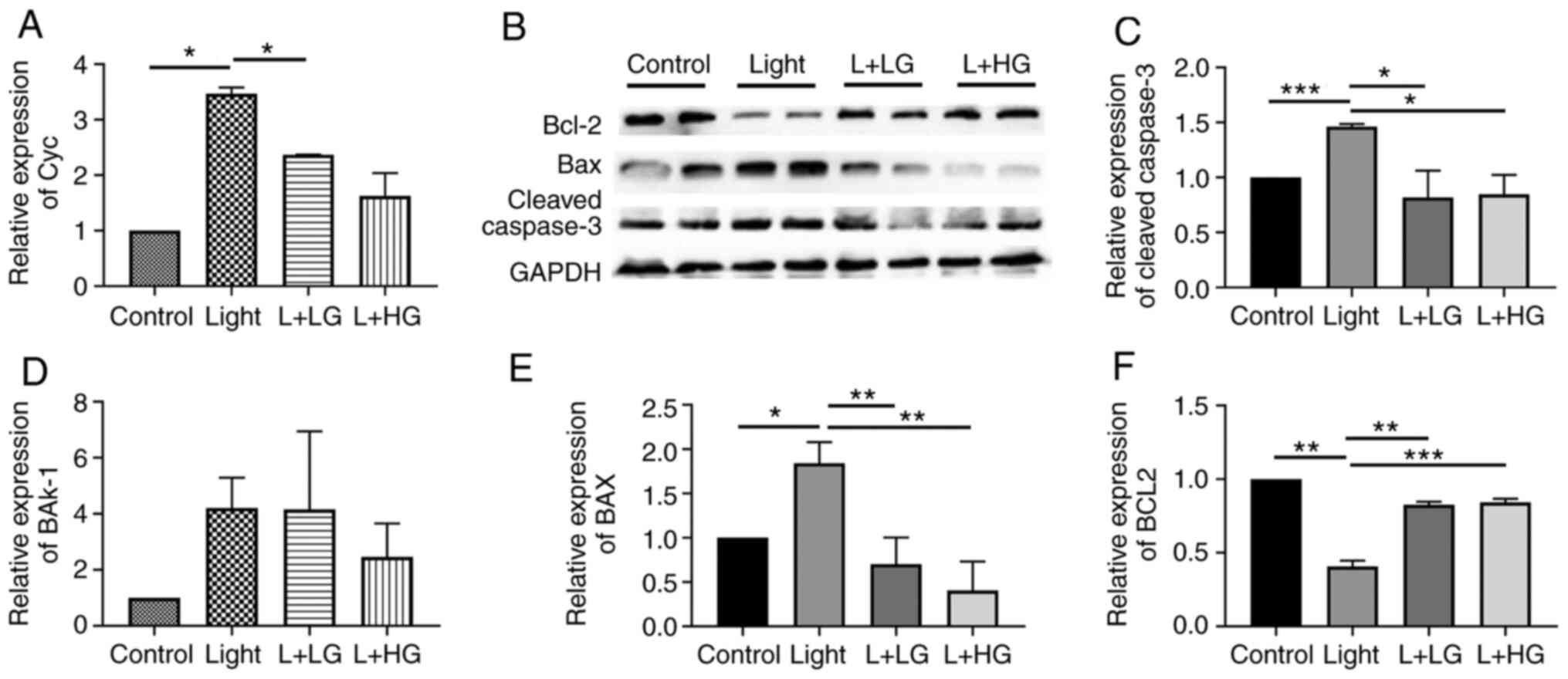|
1
|
Nash TR, Chow ES, Law AD, Fu SD, Fuszara
E, Bilska A, Bebas P, Kretzschmar D and Giebultowicz JM: Daily
blue-light exposure shortens lifespan and causes brain
neurodegeneration in Drosophila. NPJ Aging Mech Dis.
5(8)2019.PubMed/NCBI View Article : Google Scholar
|
|
2
|
Contín M, Benedetto M, Quinteros-Quintana
M and Guido M: Light pollution: The possible consequences of
excessive illumination on retina. Eye (Lond). 30:255–263.
2016.PubMed/NCBI View Article : Google Scholar
|
|
3
|
Kong L, Liu B, Zhang C, Wang B, Wang H,
Song X, Yang Y, Ren X, Yin L, Kong H and Ma H: The therapeutic
potential of sulforaphane on light-induced photoreceptor
degeneration through antiapoptosis and antioxidant protection.
Neurochem Int. 100:52–61. 2016.PubMed/NCBI View Article : Google Scholar
|
|
4
|
Hu Z, Zhang Y, Wang J, Mao P, Lv X, Yuan
S, Huang Z, Ding Y, Xie P and Liu Q: Knockout of Ccr2 alleviates
photoreceptor cell death in rodent retina exposed to chronic blue
light. Cell Death Dis. 7(e2468)2016.PubMed/NCBI View Article : Google Scholar
|
|
5
|
Murakami Y, Notomi S, Hisatomi T, Nakazawa
T, Ishibashi T, Miller JW and Vavvas DG: Photoreceptor cell death
and rescue in retinal detachment and degenerations. Prog Retin Eye
Res. 37:114–140. 2013.PubMed/NCBI View Article : Google Scholar
|
|
6
|
Schäfer N, Grosche A, Schmitt SI, Braunger
BM and Pauly D: Complement components showed a time-dependent local
expression pattern in constant and acute white light-induced
photoreceptor damage. Front Mol Neurosci. 10(197)2017.PubMed/NCBI View Article : Google Scholar
|
|
7
|
Maeda A, Palczewska G, Golczak M, Kohno H,
Dong Z, Maeda T and Palczewski K: Two-photon microscopy reveals
early rod photoreceptor cell damage in light-exposed mutant mice.
Proc Natl Acad Sci USA. 111:E1428–E1437. 2014.PubMed/NCBI View Article : Google Scholar
|
|
8
|
Bian M, Du X, Cui J, Wang P, Wang W, Zhu
W, Zhang T and Chen Y: Celastrol protects mouse retinas from bright
light-induced degeneration through inhibition of oxidative stress
and inflammation. J Neuroinflammation. 13(50)2016.PubMed/NCBI View Article : Google Scholar
|
|
9
|
Masuda T, Shimazawa M and Hara H: Retinal
diseases associated with oxidative stress and the effects of a free
radical scavenger (Edaravone). Oxid Med Cell Longev.
2017(9208489)2017.PubMed/NCBI View Article : Google Scholar
|
|
10
|
Smolková K, Mikó E, Kovács T,
Leguina-Ruzzi A, Sipos A and Bai P: Nuclear factor erythroid
2-related factor 2 in regulating cancer metabolism. Antioxid Redox
Signal. 33:966–997. 2020.PubMed/NCBI View Article : Google Scholar
|
|
11
|
Canning P, Sorrell FJ and Bullock AN:
Structural basis of Keap1 interactions with Nrf-2. Free Radic Biol
Med. 88:101–107. 2015.PubMed/NCBI View Article : Google Scholar
|
|
12
|
Tanito M, Kwon YW, Kondo N, Bai J,
Masutani H, Nakamura H, Fujii J, Ohira A and Yodoi J:
Cytoprotective effects of geranylgeranylacetone against retinal
photooxidative damage. J Neurosci. 25:2396–2404. 2005.PubMed/NCBI View Article : Google Scholar
|
|
13
|
Lv J, Bao S, Liu T, Wei L, Wang D, Ye W,
Wang N, Song S, Li J, Chudhary M, et al: Sulforaphane delays
diabetes-induced retinal photoreceptor cell degeneration. Cell
Tissue Res. 382:477–486. 2020.PubMed/NCBI View Article : Google Scholar
|
|
14
|
Nishinaka Y, Masutani H, Nakamura H and
Yodoi J: Regulatory roles of thioredoxin in oxidative
stress-induced cellular responses. Redox Rep. 6:289–295.
2001.PubMed/NCBI View Article : Google Scholar
|
|
15
|
Cebula M, Schmidt EE and Arnér ESJ: TrxR1
as a potent regulator of the Nrf2-Keap1 response system. ARS.
23:823–853. 2015.PubMed/NCBI View Article : Google Scholar
|
|
16
|
Ren X, Sun H, Zhang C, Li C, Wang J, Shen
J, Yu D and Kong L: Protective function of pyridoxamine on retinal
photoreceptor cells via activation of the p-Erk1/2/Nrf-2/Trx/ASK1
signalling pathway in diabetic mice. Mol Med Rep. 14:420–424.
2016.PubMed/NCBI View Article : Google Scholar
|
|
17
|
Isah T: Rethinking Ginkgo biloba L.:
Medicinal uses and conservation. Pharmacogn Rev. 9:140–148.
2015.PubMed/NCBI View Article : Google Scholar
|
|
18
|
Zuo W, Yan F, Zhang B, Li J and Mei D:
Advances in the studies of Ginkgo biloba leaves extract on
aging-related diseases. Aging Dis. 8:812–826. 2017.PubMed/NCBI View Article : Google Scholar
|
|
19
|
Zaghlool SS, Hanaf LK, Afifi NM and
Ibrahim ER: Histological and immunohistochemical study on the
protective effect of Ginkgo biloba extract against
glutamate-induced neurotoxicity in male albino rat retinal cells.
Egypt J Histol. 35:176–188. 2012.
|
|
20
|
Chen XJ, Ren SM, Dong JZ, Qiu CG, Chen YW
and Tao HL: Ginkgo biloba extract-761 protects myocardium by
regulating Akt/Nrf-2 signal pathway. Drug Des Devel Ther.
13:647–655. 2019.PubMed/NCBI View Article : Google Scholar
|
|
21
|
Liu SQ, Xu CY, Qin MB, Tan L, Zhuge CF,
Mao YB, Lai MY and Huang JA: Ginkgo biloba extract enhances
chemotherapy sensitivity and reverses chemoresistance through
suppression of the KSR1-mediated ERK1/2 pathway in gastric cancer
cells. Oncol Rep. 33:2871–2882. 2015.PubMed/NCBI View Article : Google Scholar
|
|
22
|
Czauderna C, Palestino-Dominguez M,
Castven D, Becker D, Zanon-Rodriguez L, Hajduk J, Mahn FL, Herr M,
Strand D, Strand S, et al: Ginkgo biloba induces different gene
expression signatures and oncogenic pathways in malignant and
non-malignant cells of the liver. PLoS One.
13(e0209067)2018.PubMed/NCBI View Article : Google Scholar
|
|
23
|
Ranchon I, Gorrand JM, Cluzel J,
Droy-Lefaix MT and Doly M: Functional protection of photoreceptors
from light-induced damage by dimethylthiourea and Ginkgo biloba
extract. Invest Ophth Vis. 40:1191–1199. 1999.PubMed/NCBI
|
|
24
|
Finucane DM, Bossy-Wetzel E, Waterhouse
NJ, Cotter TG and Green DR: Bax-induced caspase activation and
apoptosis via cytochromec release from mitochondria is inhibitable
by Bcl-xL. J Biol Chem. 274:2225–2233. 1999.PubMed/NCBI View Article : Google Scholar
|
|
25
|
Arango-Gonzalez B, Trifunović D, Sahaboglu
A, Kranz K, Michalakis S, Farinelli P, Koch S, Koch F, Cottet S,
Janssen-Bienhold U, et al: Identification of a common non-apoptotic
cell death mechanism in hereditary retinal degeneration. PLoS One.
9(e112142)2014.PubMed/NCBI View Article : Google Scholar
|
|
26
|
Ali D, Tripathi A, Al Ali H, Shahi Y,
Mishra KK, Alarifi S, Alkahtane AA and Manohardas S: ROS-dependent
Bax/Bcl2 and caspase 3 pathway-mediated apoptosis induced by zineb
in human keratinocyte cells. Onco Targets Ther.
11(489)2018.PubMed/NCBI View Article : Google Scholar
|
|
27
|
Wang A, Yang Q, Li Q, Wang X, Hao S, Wang
J and Ren M: Ginkgo Biloba L. extract reduces H2O2-induced bone
marrow mesenchymal stem cells cytotoxicity by regulating
mitogen-activated protein kinase (MAPK) signaling pathways and
oxidative stress. Med Sci Mon Int Med J Exp Clin Res. 24:3159–3167.
2018.PubMed/NCBI View Article : Google Scholar
|
|
28
|
Wang Y, Lv J, Cheng Y, Du J, Chen D, Li C
and Zhang J: Apoptosis induced by Ginkgo biloba (EGb761) in
melanoma cells is Mcl-1-dependent. PLoS One.
10(e0124812)2015.PubMed/NCBI View Article : Google Scholar
|
|
29
|
Tang L, Bao S, Du Y, Jiang Z, Wuliji A,
Ren X, Zhang C, Chu H, Kong L and Ma H: Antioxidant effects of
Lycium barbarum polysaccharides on photoreceptor degeneration in
the light-exposed mouse retina. Biomed Pharmacother. 103:829–837.
2018.PubMed/NCBI View Article : Google Scholar
|
|
30
|
Liu J, Wei L, Wang Z, Song S, Lin Z, Zhu
J, Ren X and Kong L: Protective effect of Liraglutide on diabetic
retinal neurodegeneration via inhibiting oxidative stress and
endoplasmic reticulum stress. Neurochem Int: 104624, 2019.
|
|
31
|
Livak KJ and Schmittgen TD: Analysis of
relative gene expression data using real-time quantitative PCR and
the 2(-Delta Delta C(T)) method. Methods. 25:402–408.
2001.PubMed/NCBI View Article : Google Scholar
|
|
32
|
Lin CW, Yang CM and Yang CH: Effects of
the emitted light spectrum of liquid crystal displays on
light-induced retinal photoreceptor cell damage. Int J Mol Sci.
20(2318)2019.PubMed/NCBI View Article : Google Scholar
|
|
33
|
Randazzo J, Zhang Z, Hoff M, Kawada H,
Sachs A, Yuan Y, Haider N and Kador P: Orally active
multi-functional antioxidants are neuroprotective in a rat model of
light-induced retinal damage. PLoS One. 6(e21926)2011.PubMed/NCBI View Article : Google Scholar
|
|
34
|
Chu-Tan JA, Rutar M, Saxena K, Wu Y,
Howitt L, Valter K, Provis J and Natoli R: Efficacy of 670 nm light
therapy to protect against photoreceptor cell death is dependent on
the severity of damage. Int J Photoenergy 2016, 2016.
|
|
35
|
Iliescu DA, Ciubotaru A, Ghiţă MA, Dumitru
A and Zăgrean L: Effect of sevoflurane preconditioning on
light-induced retinal damage in diabetic rats. Rom J Ophthalmol.
62:24–33. 2018.PubMed/NCBI
|
|
36
|
Ma K, Xu L, Zhan H, Zhang S, Pu M and
Jonas J: Dosage dependence of the effect of Ginkgo biloba on the
rat retinal ganglion cell survival after optic nerve crush. Eye
(Lond). 23:1598–1604. 2009.PubMed/NCBI View Article : Google Scholar
|
|
37
|
Biddlestone L, Corbett AD and Dolan S:
Oral administration of Ginkgo biloba extract, EGb-761 inhibits
thermal hyperalgesia in rodent models of inflammatory and
post-surgical pain. Br J Pharmacol. 151:285–291. 2007.PubMed/NCBI View Article : Google Scholar
|
|
38
|
Cheng D, Liang B and Li Y:
Antihyperglycemic effect of Ginkgo biloba extract in
streptozotocin-induced diabetes in rats. Biomed Res Int.
2013(162724)2012.PubMed/NCBI View Article : Google Scholar
|
|
39
|
Okumus S, Taysi S, Orkmez M, Saricicek E,
Demir E, Adli M and Al B: The effects of oral Ginkgo biloba
supplementation on radiation-induced oxidative injury in the lens
of rat. Pharmacogn Mag. 7:141–145. 2011.PubMed/NCBI View Article : Google Scholar
|
|
40
|
Kernt M, Walch A, Neubauer AS, Hirneiss C,
Haritoglou C, Ulbig MW and Kampik A: Filtering blue light reduces
light-induced oxidative stress, senescence and accumulation of
extracellular matrix proteins in human retinal pigment epithelium
cells. Clin Exp Ophthalmol. 40:e87–e97. 2012.PubMed/NCBI View Article : Google Scholar
|
|
41
|
Aydin Y, Chedid M, Chava S, Williams DD,
Liu S, Hagedorn CH, Sumitran-Holgersson S, Reiss K, Moroz K, Lu H,
et al: Activation of PERK-Nrf-2 oncogenic signaling promotes
Mdm2-mediated Rb degradation in persistently infected HCV culture.
Sci Rep. 7(9223)2017.PubMed/NCBI View Article : Google Scholar
|
|
42
|
Munemasa Y, Ahn J, Kwong J, Caprioli J and
Piri N: Redox proteins thioredoxin 1 and thioredoxin 2 support
retinal ganglion cell survival in experimental glaucoma. Gene Ther.
16:17–25. 2009.PubMed/NCBI View Article : Google Scholar
|
|
43
|
Kong L, Tanito M, Huang Z, Li F, Zhou X,
Zaharia A, Yodoi J, McGinnis JF and Cao W: Delay of photoreceptor
degeneration in tubby mouse by sulforaphane. J Neurochem.
101:1041–1052. 2007.PubMed/NCBI View Article : Google Scholar
|
|
44
|
Wu L, Gao L, Cao Y, Chen F, Sun T and Liu
Y: Analysis of the protective mechanism of liraglutide on
retinopathy based on diabetic mouse model. Saudi J Biol Sci.
26:2096–2101. 2019.PubMed/NCBI View Article : Google Scholar
|
|
45
|
Ma Q: Role of Nrf-2 in oxidative stress
and toxicity. Annu Rev Pharmacol Toxicol. 53:401–426.
2013.PubMed/NCBI View Article : Google Scholar
|
|
46
|
Ryter SW, Kim HP, Hoetzel A, Park JW,
Nakahira K, Wang X and Choi AM: Mechanisms of cell death in
oxidative stress. Antioxid Redox Signal. 9:49–89. 2007.PubMed/NCBI View Article : Google Scholar
|
|
47
|
Lo AC, Woo TT, Wong RL and Wong D:
Apoptosis and other cell death mechanisms after retinal detachment:
Implications for photoreceptor rescue. Ophthalmologica. 226 (Suppl
1):S10–S17. 2011.PubMed/NCBI View Article : Google Scholar
|
|
48
|
Peter ME, Heufelder AE and Hengartner MO:
Advances in apoptosis research. Proc Natl Acad Sci USA.
94:12736–12737. 1997.PubMed/NCBI View Article : Google Scholar
|
|
49
|
D'amelio M, Cavallucci V and Cecconi F:
Neuronal caspase-3 signaling: Not only cell death. Cell Death
Differ. 17:1104–1114. 2010.PubMed/NCBI View Article : Google Scholar
|
|
50
|
Adams JM and Cory S: Bcl-2-regulated
apoptosis: Mechanism and therapeutic potential. Curr Opin Immunol.
19:488–496. 2007.PubMed/NCBI View Article : Google Scholar
|
|
51
|
Gogada R, Prabhu V, Amadori M, Scott R,
Hashmi S and Chandra D: Resveratrol induces p53-independent,
X-linked inhibitor of apoptosis protein (XIAP)-mediated Bax protein
oligomerization on mitochondria to initiate cytochrome c release
and caspase activation. J Biol Chem. 286:28749–28760.
2011.PubMed/NCBI View Article : Google Scholar
|



















